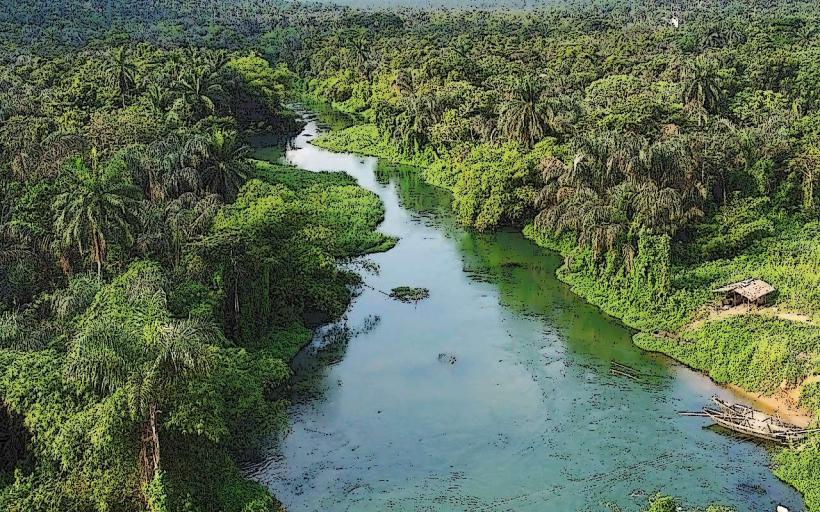Information
Landmark: Arochukwu Long Juju Slave RouteCity: Abia
Country: Nigeria
Continent: Africa
Arochukwu Long Juju Slave Route, Abia, Nigeria, Africa
The Arochukwu Long Juju Slave Route is a historical and cultural landmark located in Arochukwu, a town in the southeastern part of Nigeria. This site holds immense significance due to its role in the transatlantic slave trade and its cultural relevance to the Igbo people. It is particularly famous for the role it played in the spiritual and religious practices of the region, as well as its association with the Aro Confederacy, a powerful group of people in southeastern Nigeria.
Historical Background
The Arochukwu Long Juju Slave Route was a major trade route used by the Aro people during the height of the slave trade in the 18th and 19th centuries. The Aro Confederacy, which dominated much of southeastern Nigeria at the time, had a strong influence in the region due to their control of the Long Juju Shrine and the trade in slaves, palm oil, and other goods.
The Long Juju Shrine was considered a powerful religious and spiritual center for the Aro people, and it was used to enforce the authority of the Aro chiefs. It is believed that the shrine, dedicated to the god Ibini Ukpabi, was the place where individuals who were captured or traded as slaves were brought before being sold or transported to various parts of the world, including the Americas and Europe.
The Route and Its Significance
The Arochukwu Long Juju Slave Route was used by traders and raiders to bring captured individuals to the shrine, where they were subjected to rituals and blessings before being sent to the coast for shipment abroad. It is said that the route extended from the Arochukwu area through forests and villages, leading to the coast where enslaved Africans were boarded onto ships.
The shrine, located near Arochukwu, was considered sacred, and the influence of the Long Juju was felt throughout the region. The Aro Confederacy, through the shrine and its spiritual authority, was able to maintain control over the slave trade and other economic activities in southeastern Nigeria.
The Long Juju Shrine
The Long Juju Shrine is located in a cave in the Arochukwu hills and is a place of immense cultural and spiritual importance. The cave, which is still accessible to visitors today, was used for rituals and spiritual ceremonies by the Aro people. The cave contains several artifacts, including sacred objects, idols, and inscriptions that reflect the religious practices of the Aro people.
The shrine itself is dedicated to Ibini Ukpabi, the god believed to hold the power of justice and control over the spiritual and temporal affairs of the Aro people. Ibini Ukpabi was seen as a god who could provide guidance and protection to the Aro chiefs, as well as punish those who broke the law.
The End of the Slave Trade
The Arochukwu Long Juju Slave Route and the Long Juju Shrine lost much of their significance after the abolition of the transatlantic slave trade in the early 19th century. The British colonial administration, which established control over Nigeria in the late 19th century, worked to suppress the slave trade and dismantle the Aro Confederacy's influence in the region.
Despite the decline of the slave trade, the Arochukwu Long Juju Slave Route and its associated shrine continue to be important cultural and historical landmarks. They serve as reminders of the region's role in the larger context of the transatlantic slave trade and the complex interplay of spiritual, political, and economic forces during that period.
Tourism and Cultural Preservation
Today, the Arochukwu Long Juju Slave Route is a significant tourist attraction. Visitors come to explore the Long Juju Shrine, the slave route, and the Arochukwu hills. The site is not only of historical importance but also of cultural significance, as it serves as a symbol of the resilience and strength of the Aro people and their role in the history of Nigeria.
Efforts are being made to preserve and protect the site, ensuring that it remains an important part of Nigeria's historical heritage. There are also ongoing educational initiatives aimed at raising awareness about the history of the slave trade and the role that places like the Arochukwu Long Juju Slave Route played in it.
Visiting the Site
Location: The Arochukwu Long Juju Slave Route is located in Arochukwu, Abia State, southeastern Nigeria.
Attractions: Visitors can explore the Long Juju Shrine, the slave route, and the caves in the surrounding hills. There are also cultural performances and traditional dances that take place in the area.
Accessibility: The site is accessible via road, though visitors may need to take local transportation to reach the shrine and caves, which are located outside the main town area.
Conclusion
The Arochukwu Long Juju Slave Route is a poignant reminder of Nigeria's complex history, particularly its role in the transatlantic slave trade. The Long Juju Shrine remains a symbol of the spiritual and political authority of the Aro Confederacy, and the route itself tells the story of the horrors of slavery and the resilience of those who were affected by it. The site today stands as a place of cultural reflection and a key part of Nigeria's historical heritage.




